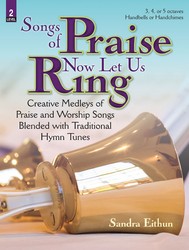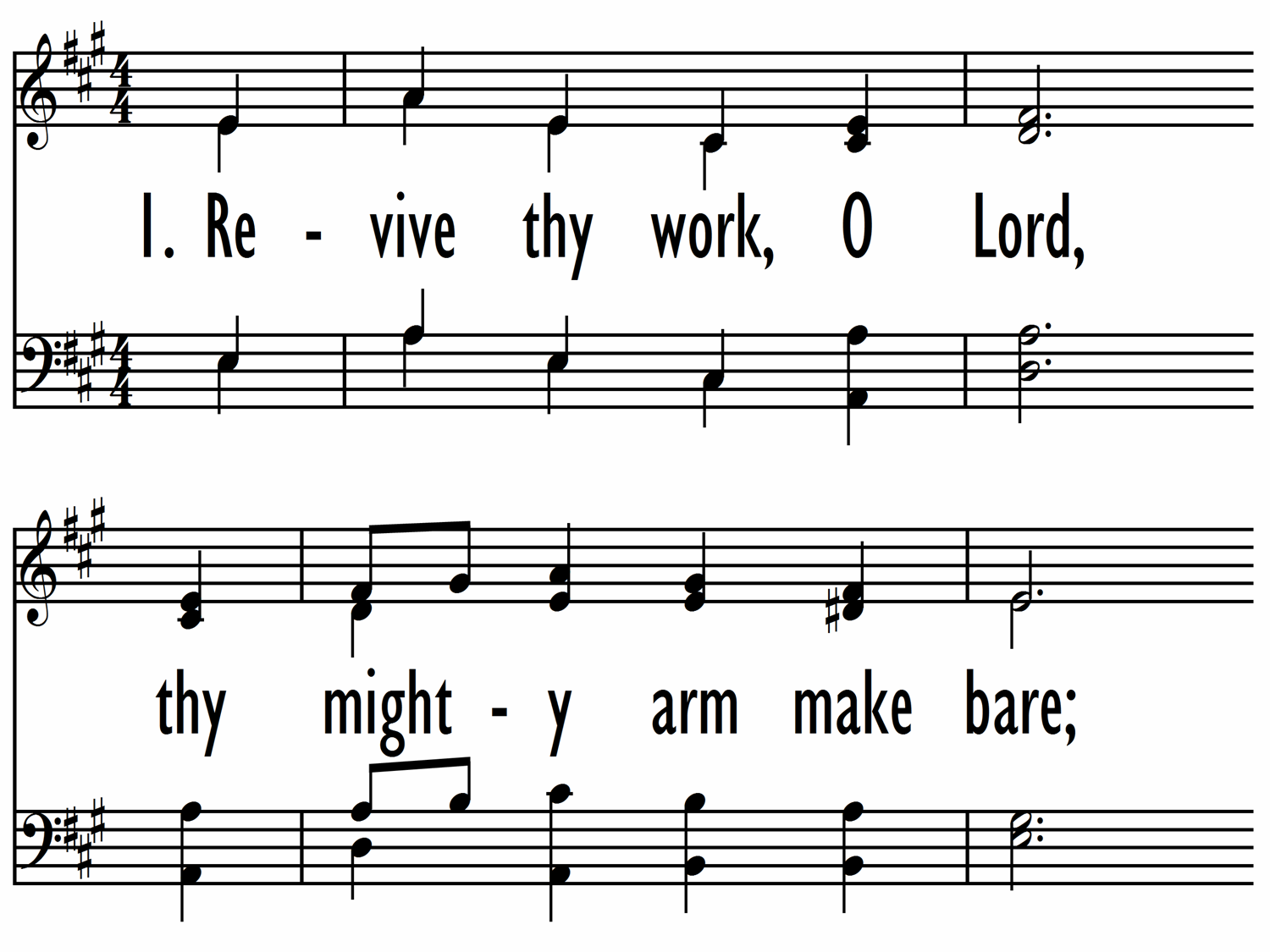- |
User Links
Revive Thy Work, O Lord

Revive Thy work, O Lord, Thy mighty arm make bare
Author: Albert Midlane (1858)Published in 243 hymnals
Printable scores: PDF, MusicXMLAudio files: MIDI, Recording
Representative Text
1 Revive Thy work, O Lord,
Thy mighty arm make bare;
speak with the voice that wakes the dead,
and make Thy people hear.
Refrain:
Revive Thy work, O Lord,
while here to Thee we bow;
descend, O gracious Lord, descend!
O come and bless us now.
2 Revive Thy work, O Lord,
now let us thirst for Thee;
and hung'ring for the bread of life
may all our spirits be. [Refrain]
3 Revive Thy work, O Lord,
exalt Thy precious name;
and, by the Holy Ghost, our love
for Thee and Thine inflame. [Refrain]
4 Revive Thy work, O Lord,
give pow'r unto Thy word;
grant that Thy blessed gospel may
in living faith be heard. [Refrain]
5 Revive Thy work, O Lord,
and give refreshing show'rs;
the glory shall be all Thine own,
the blessing, Lord, be ours. [Refrain]
Source: Our Great Redeemer's Praise #72
Author: Albert Midlane
 Midlane, Albert, was born at Newport, Isle of Wight, Jan. 23, 1825, and was engaged in business in that town for many years. To his Sunday school teacher he ascribes the honour of prompting him to poetic efforts: and the same teacher did much to shape his early life. His first printed hymn, "Hark! in the presence of our God," was written in September, 1842, at Carisbrooke Castle, and printed in the Youth’s Magazine in November of the same year. Since then he has written over 300, and of these a large proportion are in common use. They appeared in magazines and small mission hymn-books, including:—
(1) The Youth's Magazine; (2) The British Messenger; (3) The London Messenger; (4) Trotter's Evangelical Hymn Book, 1860; (5) The Ambassador… Go to person page >
Midlane, Albert, was born at Newport, Isle of Wight, Jan. 23, 1825, and was engaged in business in that town for many years. To his Sunday school teacher he ascribes the honour of prompting him to poetic efforts: and the same teacher did much to shape his early life. His first printed hymn, "Hark! in the presence of our God," was written in September, 1842, at Carisbrooke Castle, and printed in the Youth’s Magazine in November of the same year. Since then he has written over 300, and of these a large proportion are in common use. They appeared in magazines and small mission hymn-books, including:—
(1) The Youth's Magazine; (2) The British Messenger; (3) The London Messenger; (4) Trotter's Evangelical Hymn Book, 1860; (5) The Ambassador… Go to person page >Text Information
| First Line: | Revive Thy work, O Lord, Thy mighty arm make bare |
| Title: | Revive Thy Work, O Lord |
| Author: | Albert Midlane (1858) |
| Meter: | 6.6.8.6 |
| Language: | English |
| Refrain First Line: | Revive! revive |
| Notes: | Spanish translation: See "Aviva tu obra, oh Dios" by Thomas M. Westrup; Swahili translation: See "Tuhuishe, Bwana" |
| Copyright: | Public Domain |
English
- A Missionary Hymn Book #210
- Alexander's Hymns No. 3: with standard hymns #221
- Ausgewahlte Lieder des Evangeliums (Selected Gospel Songs) #d82
- Bible Truth Hymns #410
- Book of Common Praise #d477
- Book of Hymns and Tunes, comprising the psalms and hymns for the worship of God, approved by the general assembly of 1866, arranged with appropriate tunes... by authority of the assembly of 1873 #376d
- Brightest and Best #d122
- Celestial Songs: a collection of 900 choice hymns and choruses, selected for all kinds of Christian Getherings, Evangelistic Word, Solo Singers, Choirs, and the Home Circle #29
- Choice Hymns of the Faith #349
- Christ in Song: for all religious services nearly one thousand best gospel hymns, new and old with responsive scripture readings (Rev. and Enl.) #711 10 shown out of 175
German
Russian
Notes
Revive Thy work, O Lord, Thy mighty arm make bare. A. Midlane. [Home Missions.] First published in the British Messenger, Oct. 1858, again in the Evangelical Hymn Book , 1860, and again in a large number of hymnals in Great Britain and America. The original text is usually given with the change of stanza v. 1. 2, "Give pentecostal showers," to "And give refreshing showers," as in the Hymnal Companion, No. 150. It is one of the most popular of Mr. Midlane's hymns.
--John Julian, Dictionary of Hymnology (1907)
Access an additional article on the Canterbury Dictionary of Hymnology:
Tune
[Revive Thy work, O Lord!] (J. McGranahan)DENNIS (Nägeli)
Lowell Mason (PHH 96) arranged DENNIS and first published it in The Psaltery (1845), a hymnal he compiled with George. Webb (PHH 559). Mason attributed the tune to Johann G. Nageli (b. Wetzikon, near Zurich, Switzerland, 1773; d. Wetzikon, 1836) but included no source reference. Nageli presumably pu…
[Revive Thy work, O Lord] (Doane)


 My Starred Hymns
My Starred Hymns





